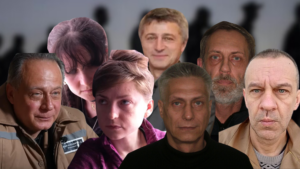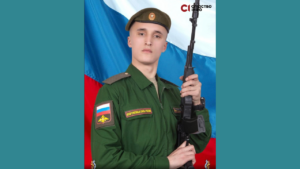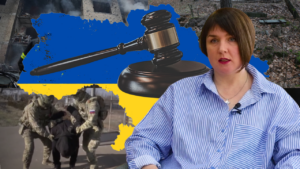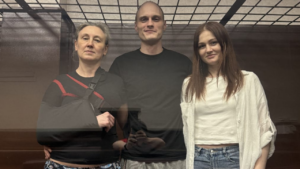“Teaching to love Russia.” How Ukrainian courts punish collaborators in education
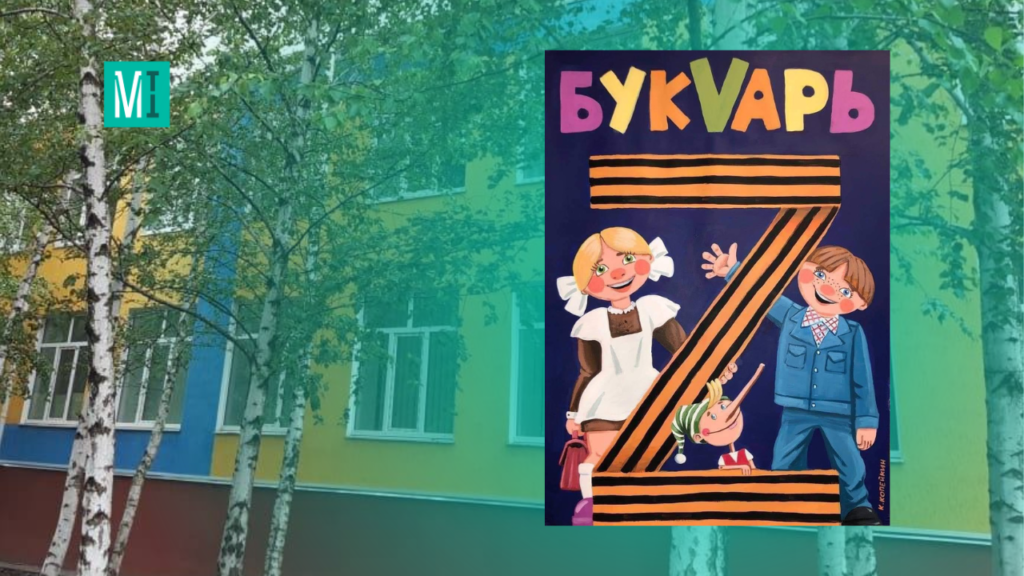
A new school year has begun. For the occupied territories, this means portraits of Putin and Russian flags in educational institutions, the quest “In Search of Symbols of Russia” with a birch tree, a nesting doll, and a bear, and poems by schoolchildren about “Russians who are ready to fight in a fair fight.” This is part of the Russian educational programs they are trying to impose on the occupied territories. According to these programs, children and teenagers are taught by “retrained” Ukrainian educators who have sided with the Russians. The MIHR investigated how the judicial practice regarding collaborators in education is formed in Ukraine, its shortcomings, and who is punished for what.
What can educators be punished for?
The punishment for collaboration is provided for in Article 111-1 of the Criminal Code. Part 3 of this article is specifically about educators. It is about those engaged in propaganda in educational institutions and implementing Russian educational standards. This is punishable by up to two years of correctional labor, arrest for up to six months or imprisonment for up to three years, and a ban for up to 15 years to hold certain positions or engage in educational activities.
Part 5 of the same article mentions those who held senior positions in the illegal authorities in the occupied territory in general, not only in the field of education, and they face up to ten years in prison. For example, a “pseudo-minister of education” or “head of an educational authority” can be punished this way.
Educators can also be tried under other articles of the Criminal Code related to crimes against national security. For example, under Article 111-2 of the CCU, “aiding the aggressor state.” However, knowing how many people from the education sector have been charged under this article is complicated.
As of the beginning of September 2023, the register of court decisions contains 12 verdicts under part 3 of Article 111-1 of the Criminal Code. Seven were handed down in absentia because the defendants were in the occupied territories. They will be taken into custody when they are arrested. They will also be able to appeal their sentences and have them reviewed.
Only one person was sentenced to prison in the cases involving the defendants. The other four cases resulted in short-term arrest, correctional labor, or suspended sentences. The court also banned all of them from holding positions in government and education for 10-15 years.
Why are these articles criticized?
Ukrainian and international experts criticize Ukrainian legislation on collaborationism in education.
Andrii Yakovlev, an Institute for Human Rights expert and managing partner of Umbrella, believes that criminal liability under Article 111-1 of the Criminal Code should be replaced with administrative penalty, i.e., lustration. Instead, criminal liability should be reserved for those educators who participated in repressions or committed treason.
Almost any activity during the occupation can fall under the articles of the Criminal Code related to national security. At the same time, law enforcement officers can choose from several articles that provide for severe punishments without restriction. The law does not consider that during the occupation, interaction with the Russian “administration” can be not only because of siding with them but also for the sake of safety and survival.
That is, the behavior of people under occupation is assessed only through the prism of criminal liability. This indicates that a far-sighted state policy towards them has not been formed.
This is evident in the case of educators. People under occupation should have access to essential services, including education. International humanitarian law states that the occupier is responsible for the continuity of the educational process. Therefore, if Ukrainian educators taught in the occupation but did not act against national security, that is, did not help Russians gain a foothold in the occupied territories, they should not be prosecuted under criminal law.
However, in the occupied territory, Russia not only provides the educational process but also carries out propaganda in educational institutions. For example, the subject of “Geography” in the Russian version is transformed into “Political Geography.” Part 3 of Article 111-1 of the Criminal Code refers to Russian propaganda in educational institutions, but according to Andriy Yakovlev, it also has drawbacks:
— The law does not clearly distinguish between “implementation of the aggressor’s education standards” and legitimate educational activities. Some experts believe that only those educators who carried out propaganda in the interests of the Russian Federation participated in repressions, actively implemented Russian standards, or voluntarily took up leadership positions should be held accountable.
The vagueness of the wording is also pointed out in the Report of the Office of the United Nations High Commissioner for Human Rights: “On the human rights situation in Ukraine for the period from August 1, 2022 to January 31, 2023”. In other words, Article 111-1 of the CCU does not meet the criterion of clarity of the law: there is no unambiguity, accessibility to understanding, and predictability. This makes it difficult to determine which behavior is lawful and which is not. Therefore, law enforcement officers can apply it arbitrarily.
From the point of view of international law, the purity of the in absentia trial process is also problematic. Under the in absentia procedure, a person who does not appear at a trial can be tried in absentia – but only if they have been duly notified of the investigation and refused to participate in the proceedings.
Since the defendants in such cases live in Russia or on temporarily occupied territory, it is difficult for the investigator to inform the person of the suspicion or accusation. This is not facilitated by the simplified approach to summons provided by law. According to Ukrainian law, the proper notification is the publication of the summons on the website of the Prosecutor General’s Office. However, in European practice, the requirements are stricter.
In absentia, it is also important to have a high-quality defense. Without this, we will have a one-sided trial. To understand this, it can be presented as follows: if there is no defense, there is no one to oppose the prosecutor’s accusation, reducing the court’s ability to find a balance between the parties’ arguments. A one-sided trial creates a presumption of an unfair practice, which opens the way for the accused to go to international courts, and we may see unpleasant decisions.
In conclusion, Andrii Yakovlev advises to take into account whether the work for the Russians was voluntary:
— Many professions involve voluntary cooperation. It’s one thing when a teacher has worked and continues to work after the occupation. And it is another when they have applied to the occupiers for a leadership position in education.
Court practice
To illustrate the peculiarities of the trials of educators, the MIHR chose three stories.
The “head” of the Balakliya education department.
When the Russians occupied Balakliia in the Kharkiv region, Olena Yarmolenko worked in the city council’s education department. She was a consultant at the Center for Professional Development of Teachers.
According to the investigation, the woman cooperated with the Russians and, from June to September 2022, served as the head of the “education department” in the “temporary civil administration.” She attended meetings of the occupiers, organized the educational process according to Russian programs, issued orders for recruitment, and sent teachers to Kursk for “retraining.” Yarmolenko also instructed her subordinates to remove “nationalist” literature and Ukrainian state symbols from schools. By her order, graduates were given certificates with the stamp of the Russian Federation.
At the trial, the woman pleaded guilty. She said she had a minor son, a pensioner mother, and a brother with a disability whom she could not take out of the city. She feared for her family because the Russians were killing and robbing the locals. So she agreed to work for the occupiers. Russian soldiers approached Olena Yarmolenko on the street in June. They had weapons and asked who she was and where she lived. They said she was the only teacher left in Balakliya, so she had to “come to еру administration for a meeting”.

Detention of Olena Yarmolenko. Photo: Kharkiv Regional Prosecutor’s Office
At the trial, Yarmolenko argued that she hid the documentation when the Russians destroyed Ukrainian books to save at least something. She also helped a local teenager secretly pass an exam at a Kharkiv university.
However, this did not affect the court’s decision: the woman was found guilty. The Novomoskovsk City District Court of Dnipropetrovs’k Region handed down the verdict on February 28, 2023. Under a combination of articles (parts 3 and 5 of Article 111-1 of the Criminal Code), she was sentenced to five years in prison and banned from holding positions in government and education for ten years. Her defense counsel appealed, requesting that the sentence be changed to a suspended sentence, while the prosecutor asked for a harsher punishment. The Court of Appeal upheld the verdict.
A teacher from Horlivka.
Victoria Sukhykh is a Horlivka, Donetsk region teacher, a city occupied since 2014. According to the investigation, by January 2023, Sukhykh became the deputy director for educational work at Horlivka School No. 77. Simultaneously, she taught Russian language and literature and was a class teacher.
In March-July 2023, she introduced the school to the Russian educational system and approved teachers’ salaries in rubles. In the VKontakte community of her class, she supported the armed aggression of the Russian Federation, calling the war a “special military operation.”

Profile of Horlivka school in VK. Screenshot
Here is one of her posts (translated from Russian): “8th-9th grade. Day of Crimea’s reunification with Russia. Good afternoon, guys. Today, our conversation is devoted to an important historical event – the reunification of Crimea with Russia. Guys, who remembers when it took place? On March 18, 2014, a treaty was signed on the entry into Russia of two new subjects of the Russian Federation – the Republic of Crimea and the city of federal significance, Sevastopol. Russia and Crimea – 9 years together, it would be more accurate even to say – together again, as Crimea is connected with the history of Russia from the depths of centuries. Russian Spring”.
Victoria Sukhykh also organized propaganda events. For example, in February 2023, she ordered eighth-graders to view materials from the Russian Ministry of Education on the “reunification of Crimea with Russia.” She called for participation in a story contest for the collection “For the Family” about “participants of the Euromaidan.”
The court determined that this was propaganda in educational institutions of armed aggression and the introduction of academic standards of the Russian Federation, i.e., part 3 of Article 111-1 of the Criminal Code. However, for some reason, Viktoria Sukhykh was not suspected under the grave part of the article, as was the case with the teacher from Balakliya.
The Halytskyi District Court of Lviv heard the case, and the teacher was detained in the territory controlled by Ukraine. She entered a plea agreement with the Lviv Regional Prosecutor’s Office and agreed upon a sentence. The court approved it on August 21, 2023, finding Sukhikh guilty of collaboration. She was sentenced to three years in prison and banned from holding senior positions in government and education for ten years. However, as part of a plea deal, the court imposed a two-year suspended sentence. During this time, Viktoria Sukhykh must periodically report to the probation office and inform them of any changes in her residence or employment.
On her Facebook page, a woman with the same last name, initials, and place of work poses for a photo near the school wall with Ukrainian certificates. It seems that she worked at the school before the occupation — the image was posted in 2012.

Victoria Sukhykh. Photo from the Facebook page
The school’s VKontakte page contains pro-Russian posts and reports from meetings between students and representatives of the so-called “Donetsk People’s Republic.” In between, there is a post about the school being damaged by shelling in 2022.

Horlivka school. Photo from occupation resources
Ukrainian language teacher in the so-called “Donetsk People’s Republic”.
Nikolske, near Mariupol, was occupied by Russians in the spring of 2022. Olena Yaroshuk, a Ukrainian language teacher at Nikolske Secondary School, did not leave.
According to the case file, she agreed to cooperate with the Russians and served as the school’s deputy director for educational work. Olena Yaroshuk implemented the curricula of the “Donetsk People’s Republic Ministry of Education.” In September 2022, she presented measures to prevent “extremism and terrorist ideology” among young people at the “pedagogical council.”

Nikolska school. Photo from the Facebook page
Yaroshuk pleaded guilty, as did Sukhikh from Horlivka. On February 2, 2023, the Amur-Nizhniodniprovsky District Court of Dnipro sentenced her to a year of correctional labor. Her salary will be deducted 10% in favor of the state. Yaroshuk was also banned from holding leadership positions in education for ten years. At the time of the trial, she ran a needlework club in Volyn.
And what about verdicts in absentia?
Seven teachers who are in the occupied territory received their sentences in absentia. Their interests were represented by lawyers from the Free Legal Aid Center, as required by the in absentia procedure.
In all cases, the collaborators were sentenced to prison. Each received three years in prison:
- Natalia Karavicheva, “principal” of Yakymivka school No. 26 in Zaporizhzhia Oblast;
- Natalia Shkramida, “principal” of Yakymivka school No. 27 in Zaporizhzhia oblast;
- Larysa Syvolap, “head” of Mariupol State University;
- Olena Tolstikova, “principal” of Myronivka school in Donetsk region;
- Oksana Krivenko, “head” of the Nikolskaya school in the Kherson region;
- Oksana Krivenko, “head” of a Hetmanivka, Kharkiv region village school.
Yuliana Nazarevska, the “deputy dean” of Mariupol State University, was sentenced to two years in prison.
All the collaborators were also banned from holding positions in government and education for 10 to 15 years. They will serve their sentences after detention.
The defendants received these sentences for defecting to the enemy, implementing Russian educational programs, teaching in Russian, participating in propaganda activities, and intimidating parents with the deprivation of parental rights if their children did not attend Russified schools.
According to the SSU (State Security Service of Ukraine), several dozen educators collaborating with the occupiers have already been served with suspicions of collaboration. There are no verdicts in these cases yet.
How can justice be achieved?
The “Ukraine 5AM Coalition” analyzed Ukrainian legislation related to cooperation with the enemy and identified problems. In particular, some qualifications of violations are duplicated (in Article 111-1 of the Criminal Code on collaboration and Article 111 of the Criminal Code on high treason), and the wording is unclear. This violates the principle of legal certainty. In addition, Article 111-1 of the CCU covers activities necessary to address the occupation’s humanitarian problems. That is, the issues with educators are part of the problem of Article 111-1 of the CCU in general.
Usually, criminal law targets the behavior of individuals. However, during the occupation, the situation of choice or coercion to cooperate becomes massive. It can also be a matter of survival under occupation. So, it is evident that individual measures cannot resolve the situation. A different state policy is needed.
Andrii Yakovlev, an expert at the MIPL, says that in this category of cases, there should be a balance between criminal liability and administrative procedures, such as lustration. How the state should influence people under occupation is a debatable issue, but, in his opinion, the unsystematic and almost total criminalization of this category of cases is not a manifestation of a reasonable state policy:
— Criminal law cannot solve political problems that are widespread. The institution of criminal prosecution, which is intended for peaceful life, should be used in a balanced manner.
Anastasiya Zubova, MIHR journalist



